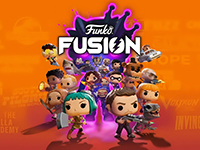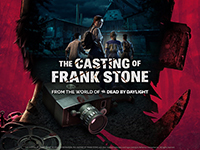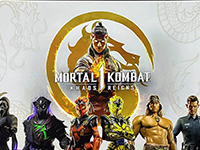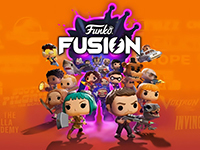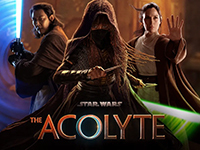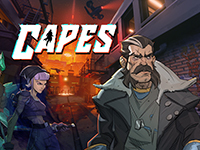
Aggrogamer: First let's talk about the old days. You started off at Black Isle with Brian Fargo and a lot of the guys at Obsidian working on the Fallout titles and some of the Gold Seal DnD games. How was it helping shape modern RPGs at the time?
Chris Avellone: Yeah, it seems like a lifetime ago… well, considering it was about 10-15 years ago, I suppose that's not surprising. At Interplay/Black Isle Brian had secured the rights to do Dungeons and Dragons titles (which was with TSR at the time), we had the chance to do some Forgotten Realms and Planescape products, and he'd also worked out a deal to do a GURPS game as well (which eventually became Fallout). Stonekeep was still in production and as the years went on, we'd start Stonekeep II as well in the later years of Black Isle.
When I first signed on to the division, Black Isle was called DragonPlay, and we working on some legacy titles that weren't necessarily RPGs (although I still learned a lot from them), but the goal of the division was to eventually make the RPGs we'd want to play. Which is sort of selfish, but there you go. We wanted to do more RPGs along the lines of the Gold Box games for sure.
So I mean this with all due humility — the renaissance occurred through a series of steps, some of which seemed like luck, and the other due to the fact Brian had the right people in the right place.
Our division head, Feargus helped create one of the biggest windfalls for the company by enlisting BioWare to do an RPG for Interplay, and the public immediately responded to the nostalgia factor of being able to play the old SSI Gold Box games in a revamped format (even though BG1 and 2 were much more than this). There was such a response to it, in fact, that the next logical step seemed to ask BioWare if we could use their engine for other products — one for Planescape (since we had the license and no game) and then again for IWD. I think all these RPGs had evolutionary aspects about them, although BG1 and BG2 certainly got the lion's share of love and attention from the fan base, and people remember those characters and companions fondly to this day.
The other renaissance crept up on Interplay, and it happened suddenly — Fallout had been in development for a number of years under the guidance of Tim Cain (who's now with us at Obsidian, working on our Project: Eternity Kickstarter). Originally, it was intended to use GURPS, and then it didn't. There was still all the other content outside of GURPS that was available to be used for the game once the GURPS license was no longer available, however, and that ended up playing out in a big way. All of the design principles the title had based on character builds and archetypes, creativity, the open-world exploration… no one at Interplay was sure if the title would take off, and when it did, it immediately became one of Interplay's strongest franchises. It also changed the way I thought about RPG design in so many ways, it's hard to list them all, but I'll try — dialogue options based on stats (including stupid options), the idea of a solely pacifistic talking path for Speech characters, the usage of skills in the environment, the idea of Karma and the use/attachment of companions (I still hold Dogmeat up to this day as one of the best examples of companions in a computer game, ever). There was so much creativity and smarts to it that most games today struggle to keep pace with.
It was a great time to develop RPGs, and I feel like we're entering that era again with Kickstarter, frankly. I'm really excited about what I'm seeing come out of the process and what it means for the future.
AG: I find the best games and films are made out of a desire for something to be made that the creator themselves want to play. George Lucas said the same reasons inspired Star Wars and Black Isles games definitely rank up there as the Star Wars of RPG's.
After Interplay was acquired by Titus, Fargo leaving and Black Isle was shuttered due to financial troubles, what inspired you and your team to start a new studio rather than joining an existing already successful studio like BioWare? Also how did your team respond to this, did it take some convincing? Did any disagree and go to competitors?
CA: "Independence" is the best answer. We were still local, we knew the kinds of games we wanted to do, and we wanted a chance to prove it. I doubt we all could have gotten jobs at BioWare (if any of us could've), and we'd always imagined Black Isle as a separate entity in any event — Feargus worked very hard to shield us from all the troubles taking place there in the last few years with Titus, although he was powerless to prevent what happened with Baldur's Gate 3 and he departed several months before Van Buren (Fallout 3) got canceled as well.
We didn't ask anyone to join us, they simply volunteered — and a lot of them volunteered. Speaking for myself, the moment Feargus walked into my office and said he had resigned, my response was "when do I quit?" That was true for a lot of people — Feargus, much like Fargo, had earned a lot of respect over the years, and the current company climate wasn't such that people were willing to remain without being able to work for those same bosses.
That wasn't true of everyone. Other folks, like Josh Sawyer, stayed on at Interplay to make a go of it and then went on to other studios (Midway, Gauntlet: Seven Sorrows), and other folks did require some persuading and then eventually left for other studios (like Blizzard). Still, a lot of the core Black Isle folks remained, and a lot of new people from other studios joined us. They were able to share the things they'd learned that worked well at other companies, so Obsidian became quite a melting pot over the years.
Don't get me wrong. I loved working at Black Isle, I loved the Infinity Engine games (even with the increasing pressure to do them faster and faster), and I had put a lot of years into crafting an experience for Fallout 3. Still, after what happened with Baldur's Gate 3, it no longer seemed reasonable to expect that that project would be allowed to be carried to completion, and sure enough, it wasn't.
AG: After the formation of Obsidian and the dissolution of your former studio and team, what troubles did you have starting Obsidian out? For a new studio did you guys just pick up where you left off, or was it kind of rough transitioning over?
As far as Fallout 3 (Van Buren) goes is there any chance the files will ever see the light of day like KOTOR2 or HL2 on Dreamcast; or even a legit release from Bethesda down the line someday?
CA: There was a rough patch. We had a lot of the core guys as owners and our new leads for KOTOR2. Our philosophy stayed the same, although we needed to learn much more about the Xbox, and quickly, but that wasn't too difficult. Still aside from the Black Isle crew that left (and continued to depart over the following months), having a number of other people come on board from other companies helped change us from being Black Isle focused and more of a melting pot, where we could pick and choose from positive learning experiences people had had at other companies.
The entire Interplay support network we had at Black Isle was gone, though — no IT, no QA, no audio department, no ability to draft help from other projects if we needed programming and art help, and we were also in the position of being solely a developer instead of a developing a title with an internal team at a publisher, which is a much different beast. The schedules were tighter and more unforgiving (as well as mutable, usually in an unfavorable direction or at the cost of previously agreed contract benefits), and we often had very little leverage with contracts and amendments. One plus was that BioWare was in our court, and they gave us support with LucasArts and Atari and helped us secure projects like Knights of the Old Republic II: The Sith Lords and Neverwinter Nights 2. Note that we had some fun hurdles with that (being unable to play Knights of the Old Republic until its release and having to develop our game in a vacuum for 2-3 months before even being exposed to Knights 1 — it made sense from a contract standpoint, but from a development standpoint, not so much).
Also, even having workspace was challenging. Our first office was Feargus's attic, and his wife Margo were more than patient with our bullshit — and when I say "patient," it's more like "Samaritan," I mean — she would even bring up snack plates. The attic was hot, smelled like developer (I don't know how she got the smell out), and with 8-10 computers burning at the highest point in the house, it could become a sweat lodge at times. After being there for several months, we moved into an office park not too far away, contended with rats, a stinky duck pond with unusually aggressive ducks that would sneak up on you while having lunch, and the sketchy next door neighbors that would raid our kitchen and soda stacks (were they part of a bookie den or were they on-the-call financial investors… who knows?). We persevered and slowly expanded to fill the whole building, both floors. We got an IT department (also from Black Isle), audio, and our own QA (courtesy of Atari and Neverwinter Nights 2 and they stayed on with us). Eventually, we moved into our present digs, which are really nice, no complaints. Except that I kind of miss the rats. And the Rat King. That guy could party.
On the plus side, coming up from that was a good team-building experience. We can still laugh about how we made it through those days, it was fun seeing everyone come on board and rise through the ranks (a number of QA folks are now part of the art, animation, design, audio, and production teams), and we have a whole bunch of conference rooms dedicated to the titles we've put out, so it's not unusual to hear that "the meeting's at 1pm in the Fallout Lounge" or "we can always run the test level in the Alpha Protocol room."
With regards to Van Buren, I don't believe those files will ever see the light of day, but I don't know. And it's not up to me anyway. Fallout belongs to Bethesda, I doubt they'd dig through those archives or if they even have all the files in order to share them with the public, and I doubt they'd even want to (I don't see what benefit it would be for them). I do know that a lot of Van Buren docs have ended up on the internet and from what I've seen; they're accurate from what I remember.
I do not believe that we'd ever see the Van Buren game made, which is fine. After all, a lot of the Van Buren stuff ended up mutating and finding a home in New Vegas in any event, so it did gain new life, even if it wasn't exactly the same as it was portrayed in Van Buren (things that showed up include: Hoover Dam, the brain-damaged Nightkin, which originated in one of our pen and paper campaigns at Interplay, Caesar's Legion, the Big Empty in Old World Blues). Also, there's nothing to say that some of the concepts (rival party, Prisoner's Dilemma) couldn't end up in some other game down the line. KOTOR 2 was different because the legacy info was still in the actual game and could be unearthed (we didn't strip those out, and while it wasn't the feeling of everyone at the studio, I'm glad we didn't strip them out).
AG: That's awesome that Van Buren has kind of lived on, and I hope you guys get another chance to revisit the Fallout franchise. Final question…
We've covered most, if not all, of your career. So let's look at the present and into the future. You and your team got to revisit Fallout again with New Vegas and it's add-ons, was this a something you and your team had to think about or was it just an instant yes?
Would you guys do another Fallout and do you think BethSoft would ever do an alternating dev cycle a-la Activision with Treyarch and IW doing CoD?
CA: Aside from getting the contract squared away, I believe everyone on at the studio was a "yes" on this. Fallout's one of the best RPG franchises to work on, and it was one we didn't think we'd get a chance to return to, and then… New Vegas came along.
We'd love to work on another Fallout, although that would depend on Bethesda. We certainly enjoyed working with them on New Vegas and we still have a lot of cool ideas and adventures we'd love to do for the Fallout universe.
AG: In closing I would like to state it has been amazing speaking to one of my heroes and reasons to continue playing games, and I am glad I got the chance to share this conversation with you all.
Chris Avellone can be found on his twitter at @ChrisAvellone and you should also follow @Obsidian as well.
I hope you all enjoy this interview as much as I did conducting it.
Thank you Chris, it has been a pleasure!











